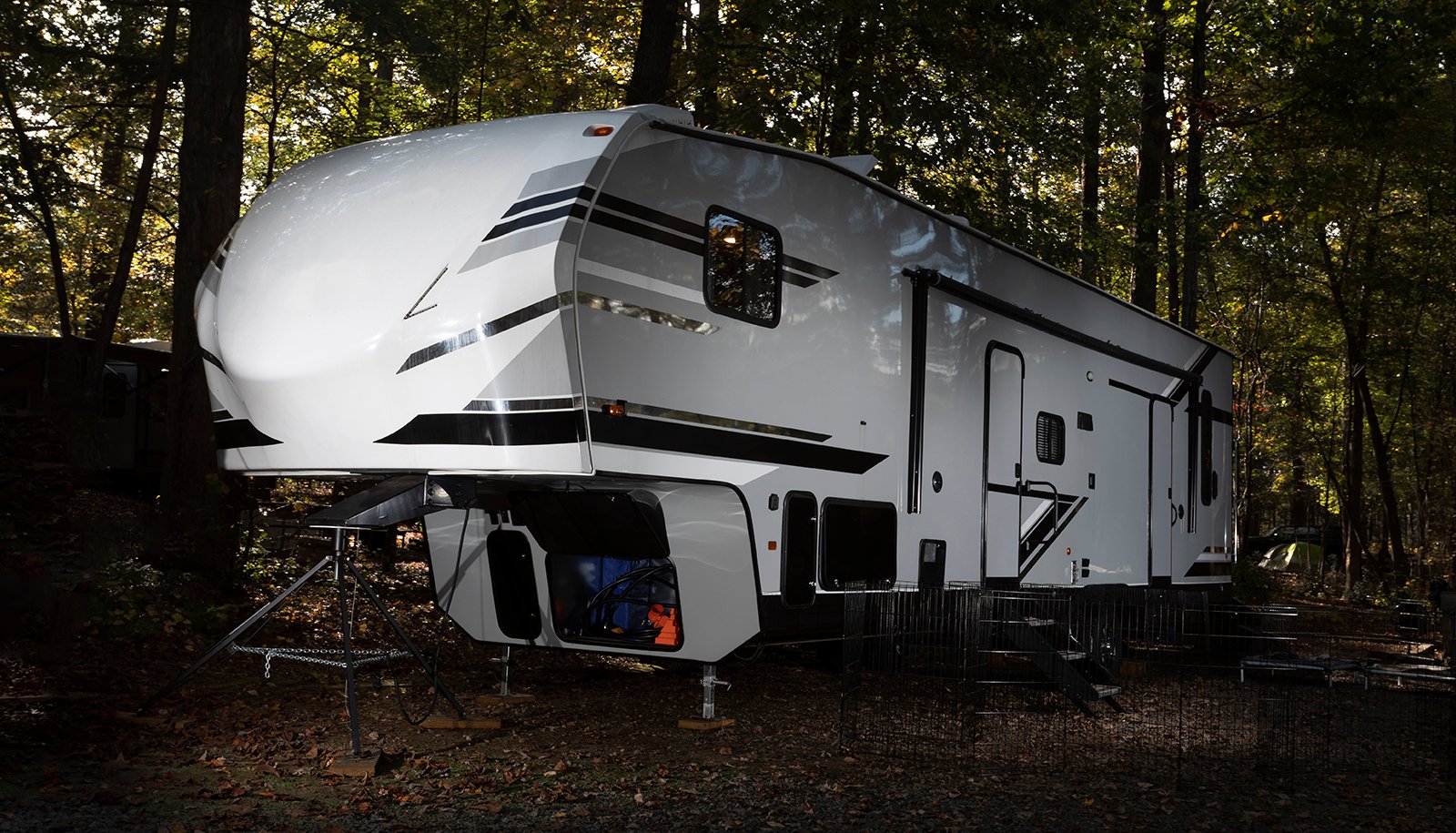Whether you're a seasoned road tripper or contemplating your first voyage into RV living, understanding what a fifth-wheel trailer offers is the first step towards unlocking an unparalleled travel experience.
WHAT ARE FIFTH-WHEEL TRAILERS?
A fifth-wheel trailer is a large, towable living space that attaches to a special hitch in the bed of a heavy-duty pickup truck.
This design offers stability and ease when handling on the road, setting it apart from traditional RVs and making it a favorite among long-term travelers and full-time residents.
The term "fifth-wheel" originates from a similar coupling used on four-wheel horse-drawn carriages and wagons in the 19th century, showcasing the enduring legacy of this versatile travel solution.
WHAT DO I NEED TO PULL A FIFTH-WHEEL TRAILER?
To start a fifth-wheel adventure, you'll need more than just wanderlust – you'll need the right vehicle. A heavy-duty pickup truck with a towing capacity that matches or exceeds the weight of your trailer is crucial.
Equally important is the fifth-wheel hitch: a specialized piece of equipment designed for the unique demands of towing these substantial homes on wheels. Before hitting the road, ensure your setup includes safety features like trailer brakes and appropriate towing mirrors for a secure and stress-free journey.
PROS & CONS OF A FIFTH-WHEEL TRAILER
Choosing a fifth-wheel trailer comes with a unique set of advantages and considerations.
Pros:
- Spacious Interiors: With generous living spaces, including slide-outs, modern fifth-wheels feel more like apartments than campers.
- Towing Stability: The unique hitch design offers unmatched towing stability, reducing sway and making long drives more comfortable.
- Luxury Amenities: Many models come equipped with high-end features like full kitchens, bathrooms, and entertainment systems.
Cons:
- Vehicle Requirements: A capable towing vehicle, typically a heavy-duty pickup, is non-negotiable.
- Size Restrictions: Their considerable size might limit where you can travel or stay.
- Investment: Both the initial purchase and ongoing maintenance can be substantial.
HOW TO CHOOSE THE RIGHT FIFTH-WHEEL TRAILER
When shopping for a fifth-wheel trailer, consider how you plan to use it. Are you looking for weekend getaways or contemplating living in a full-time RV?
Size, layout, and amenities should match your lifestyle and budget. Also, weigh the benefits of new versus used models to find the best fit for your adventures.
PROTECTING YOUR INVESTMENT WITH FIFTH-WHEEL INSURANCE
Your home on wheels is no ordinary vehicle; standard auto insurance won't cover all your needs.
Fifth-wheel insurance is essential, offering protection against road mishaps, natural disasters, and more.
Look for policies that cover personal belongings, emergency expenses, and comprehensive damage to ensure peace of mind wherever your travels take you.
MAINTENANCE & STORAGE TIPS FOR FIFTH-WHEEL TRAILERS
Maintaining and storing your fifth-wheel trailer correctly ensures its longevity and reliability. Here's a more detailed look at how to keep your home-on-wheels in prime condition.
Regular Maintenance for Fifth-Wheel Trailers
- Seal and Inspect the Roof: At least twice a year, inspect your fifth-wheel's roof for any signs of wear or leaks. Apply sealant to any cracks or gaps to prevent water damage.
- Tire Care: Check tire pressure and tread depth regularly to avoid blowouts and ensure safe travel. Consider rotating the tires annually and replacing them every 5-7 years or as needed based on wear.
- Water Systems: Before winter, thoroughly drain and winterize the water system to prevent freezing and cracking. In spring, de-winterize and check for leaks.
- Slide-Outs and Awnings: Lubricate the moving parts of slide-outs and awnings to prevent sticking and wear. Inspect the fabric of awnings for rips or tears that could worsen over time.
- Battery Maintenance: Keep battery terminals clean and check fluid levels if applicable. Ensure batteries are fully charged and disconnected when not in use.
Proper Storage for Fifth-Wheel Trailers
- Location: If possible, store your fifth wheel under a covered area or indoors to shield it from weather extremes like sun, rain, snow, and wind. This can prevent fading and paint damage and protect against leaks.
- Ventilation: Use vent covers and slightly open windows to promote air circulation inside the trailer, reducing the risk of mold and mildew during storage.
- Pest Prevention: To keep rodents and insects out, close all openings or use mesh screens to cover vents and pipes.
- Security: Consider using a wheel and hitch lock to deter theft, especially if the vehicle is stored in an unsecured location.
- Regular Check-ups: Even when not in use, inspect your fifth wheel periodically for any issues that may arise during storage, such as pests or water damage.
By following these comprehensive maintenance and storage tips, you can enjoy peace of mind knowing your fifth-wheel trailer is preserved in excellent condition and ready for your next adventure.
A fifth-wheel trailer represents freedom, comfort, and adventure. It's a choice that opens up the vast horizons of road travel with the comforts of home. By understanding what a fifth-wheel trailer entails – from the necessary equipment and insurance to the pros and cons – you're well on your way to making an informed decision about whether this lifestyle suits you.
Ready to explore more about living and traveling in a fifth-wheel? There’s a whole world out there waiting for you. Safe travels and happy trails!
If you need help finding the best RV insurance coverage for the best price, speak to a SimplyIOA agent at 833.872.4467 or get a RV insurance quote online now.











